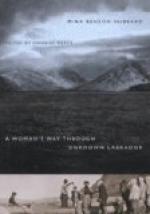When I said, “Good-bye,” they made no move to accompany me to the canoe.
“Good-bye,” said George. “Send us a fair wind.”
Smilingly they assured him that they would. In a minute we were in the canoe and pushing off from shore. As we turned down the lake, all eager to be shortening the distance between us and the post, I looked back. They were still standing just as we had left them watching us. Taking out my handkerchief I waved it over my head. Instantly the shawls and kerchiefs flew out as they waved a response, and with this parting look backward to our wilderness friends we turned our faces to Ungava.
CHAPTER XVII
THE RACE FOR UNGAVA
Five days to Ungava!
Seated in’ the canoe with time to think I could not seem to realise the situation. Indian House Lake! Five days to Ungava! Oh! how I wanted it to be true. Ungava, in spite of hopes and resolves, had seemed always far away, mysterious, and unattainable, but now it had been suddenly thrust forward almost within my reach. If true, this would mean the well-nigh certain achievement of my heart’s desire—the completion of my husband’s work. Yet there were the rapids, where the skill and judgment of the men were our safeguards. One little miscalculation and it would take but an instant to whelm us in disaster. Still we had come so far on the way with success, surely it would be given to us to reach the goal in safety. But here inevitably thought flew to one who had been infinitely worthy but who had been denied.
Five days to Ungava! and because I so much wished it to be true I was afraid, for the hard things of life will sometimes make cowards of its pilgrims.
The Barren Grounds Water was very fair in the morning sunshine. It was as if, while exploring some great ruin, we had chanced into a secret, hidden chamber, the most splendid of them all, and when after lunch the promised fair wind sprang up, and the canoes with well-filled sails were speeding northward, the lake and its guardian hills became bluer and more beautiful than ever.
Nowhere did we find the lake more than two miles wide. Long points reaching out from either shore cut off the view and seemed to change the course; but in reality they did not, for it was always northward. To right and left there were the hills, now barren altogether, or again with a narrow belt of “greenwoods”—spruce, balsam, tamarack—along the shore. In many places skeleton wigwams marked the site of old Nascaupee camps. The hills on the east in places rose abruptly from the water, but on the west they stood a little back with sand-hills on terraces between and an occasional high, wedge-shaped point of sand and loose rock reached almost halfway across the lake. Often as I looked ahead, the lake seemed to end; but, the distant point passed, it stretched on again into the north till with repetition of this experience, it began to seem as if the end would never come. Streams entered through narrow openings between the hills, or roared down their steep sides. At one point the lake narrowed to about a quarter of a mile in width where the current was very swift. Beyond this point we saw the last caribou of the trip.




